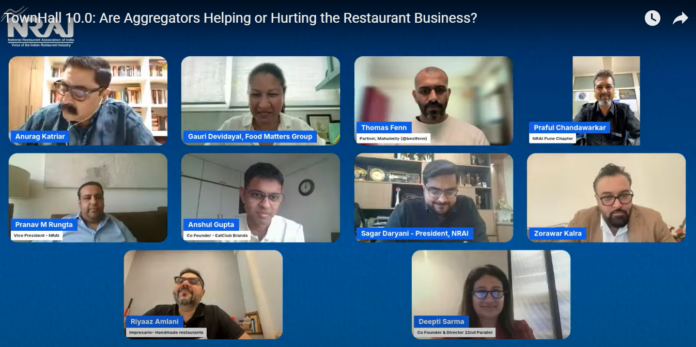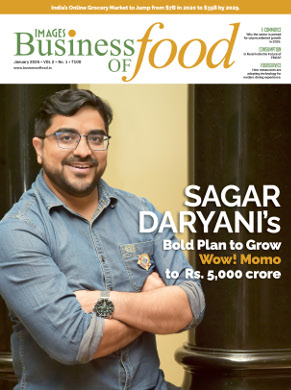Business Of Food, FMCG Brands, Food Industry, Food and Beverage, Food Retail, Retail News, Retail Industry, Food Retail News, Food Technology, Food Business Update, Food News India, Food Business Analysis, Food Service(NRAI), today successfully hosted a thought-provoking and impassioned virtual townhall, NRAI Townhall 10.0 which was attended live by more than 8000 people. The key focus of this Townhall was to discuss and debate the primary issue plaguing the food and restaurant sector, “Are Food Aggregators Helping or Hurting the Restaurant Business in India?”
NRAI Townhall 10.0 saw participation and attendees from a wide-ranging list of industry stakeholders including restaurateurs and industry experts. The townhall provided an engaging platform to debate the complex and fast-declining relationship between food aggregators and the restaurant ecosystem due to the recent uncompetitive practices of the aggregators. Leading restauranteurs and industry veterans took the time to passionately discuss this critical issue by vociferously highlighting the challenges and opportunities brought about by aggregator platforms.
Among many of the issues that were discussed, the key issues that were brought up in NRAI Townhall 10.0 were:
- Private Labelling by Aggregators: Concerns over monopolization by platforms launching private labels and leveraging restaurant data.
- Aggregator Payment Platforms: The bundling of payment gateways with reservation services, eroding autonomy and adding unnecessary costs.
- Deep Discounting Practices: Aggressive discount strategies disrupting the dine-in and food delivery sectors.
Key Findings from Audience Polls
During the course of the Townhall, NRAI conducted live polls to gauge the viewer’s sentiment on critical issues surrounding food aggregators. The polls saw enthusiastic participation, with respondents voicing strong opinions on the challenges facing the restaurant industry.
Key insights from the polls include:
- 92% of viewers believe that customer data is essential and necessary in bettering customer experience.
- 70% of viewers believe that private labels in Quick Commerce are already impacting their business.
- 69% of viewers believe that they have no negotiation powers with respect to commissions.
- 42% of viewers believe that flexibility is needed when it comes to discounting.
- 42% of viewers feel that flexibility is required in aggregators.
- 34% of viewers believe that Aggregators have stolen customers and have converted customers of restaurants into their own customers.
Key highlights of the discussion during Townhall:
Anurag Katriar, Founder & MD of Indigo Hospitality moderated the Leader’s panel with Industry Stalwarts.
Sagar Daryani, NRAI President, said, “India’s food delivery industry is at a crossroads, with profitability, sustainability, and fairness being put to the test. While we welcome developments such as quick commerce in the food delivery space, we are deeply concerned about aggregators expanding into private labels, leveraging restaurant data, and competing directly with their own partners. This practice not only creates an unfair playing field, but it also undermines the trust that is at the foundation of this ecosystem. The lack of transparency in policies, rising commissions, and aggressive ad-driven visibility models are all contributing to restaurants’ unsustainable position. We are committed to finding solutions, which include investigating third-party alternatives, encouraging dine-in growth, and working with aggregators on more equitable terms. Our industry’s survival and sustainability rely on creating a balanced ecosystem that considers the interests of all stakeholders.”
Pranav M Rungta, NRAI Vice President, Director – Mint Hospitality Pvt. Ltd., highlighted, “We saw tremendous engagement, with more than 8,000 viewers and 3,000 + active comments—proof that our collective voice is making an impact. Now more than ever, unity is key to driving the change our industry needs. While aggregators do add some value, we must ensure they support our growth without taking control. Through continuous dialogue with ministers and trustees, we are committed to safeguarding the interests of our fraternity and shaping a future where we lead with strength and collaboration.”
Zorawar Kalra, NRAI Vice President, Founder & Managing Director, Massive Restaurants Pvt. Ltd said, “The restaurant industry is built on authenticity, experiences, and value—none of which should be compromised by the cycle of deep discounting and unfair terms imposed by aggregators. While these platforms have undeniably expanded reach, their approach must align with the sustainability of the dining-out ecosystem. Collaboration is essential, but it must be fair and balanced. Restaurants should focus on creating memorable experiences, adding value during off-peak hours, and fostering direct connections with their customers. Only when we reclaim the narrative and move away from a dependency on discounts can we truly preserve the integrity and profitability of our industry.”
Riyaaz Amlani, Founder & Managing Director, Impresario Entertainment & Hospitality Pvt. Ltd, said, “The restaurant business has always been about personal connections, exceptional food, and memorable experiences. While aggregators have undeniably transformed the way customers discover and engage with us, they should be seen as tools to amplify our reach—not as gatekeepers of our customer relationships. Restaurateurs must take charge by fostering direct connections with diners, offering consistent value across channels, and using these platforms strategically as marketing avenues rather than relying on them entirely. The future of our industry depends on how we strike this balance while staying true to the heart of hospitality.”
Praful Chandawarkar, Managing Director, Chiranjeev Restaurant and Foods Pvt. Ltd. remarked saying, “Aggregators are increasingly taking control of areas like hygiene audits, but that authority should rest with restaurants. For the fraternity to reclaim our space, the industry must focus on enhancing the product—improving ambience, service, food safety, and nutrition density. When we lead with quality, aggregators become tools, not controllers. Unlike restaurants that strive to earn customer loyalty, aggregators treat loyalty as something to be sold, burdening us( fraternity) with programs that come at an unfair cost. It’s time for a movement toward excellence and independence in the restaurant industry.”
Gauri Devidayal, Co-Founder & Director, Food Matters India Pvt. Ltd. said, “Aggregators are pushing an unnecessary link between table reservations and payment gateways, claiming it benefits customers, but the reality is different. Customers already have multiple payment options, and bundling these services only imposes restrictions on restaurants while adding no real value. Unlike delivery, which involves operational efforts justifying commissions, reservations do not. Restaurants must reject commission-based fees for reservations, demand a fixed-fee model, and advocate for the separation of payment gateways to safeguard their independence and ensure fair practices.”
Anshul Gupta, Co-Founder, Eat Clubs said, “The restaurant industry has played a pivotal role in building the food delivery ecosystem, yet we now face a significant challenge as aggregators shift from partners to competitors. By setting up private labels, leveraging exclusive data, and occupying premium visibility on their platforms, they are directly competing with the very restaurants that helped establish their success. This shift undermines trust and fairness in the ecosystem. The time has come to address these practices and ensure a level playing field—one that respects the partnership between platforms and restaurants while safeguarding the interests of operators of all scales, from single outlets to national chains.”
Thomas Fenn, Partner, Mahabelly commented saying, “Table reservations are an essential service for restaurants, but aggregators are bundling them with non-essential services, forcing us to adopt their payment gateways and unnecessarily share sensitive customer data, like payment habits and business size. This practice allows aggregators to control pricing dynamics and offer discounts, while adding little to no incremental value from a service perspective. Restaurants must focus on delinking essential services from non-essential ones and avoid adopting services that don’t contribute to their growth or efficiency.”
During the Townhall, NRAI and its member partners focused on trying to find solutions to increase transparency and trust by attempting to get the Food Aggregators to adhere to clear and fair policies for both parties, including data sharing amongst others, to build trust. The townhall received overwhelming appreciation from all participants for its comprehensive discussions and actionable insights.
NRAI announced its commitment to further engage in continued dialogue with aggregators, policymakers, and industry leaders to advocate for reforms and build a transparent, equitable environment for the restaurant community. The Association firmly believes that a collaborative approach involving the industry, policymakers, and regulators is crucial to ensure the long-term sustainability and growth of the Indian restaurant sector.



